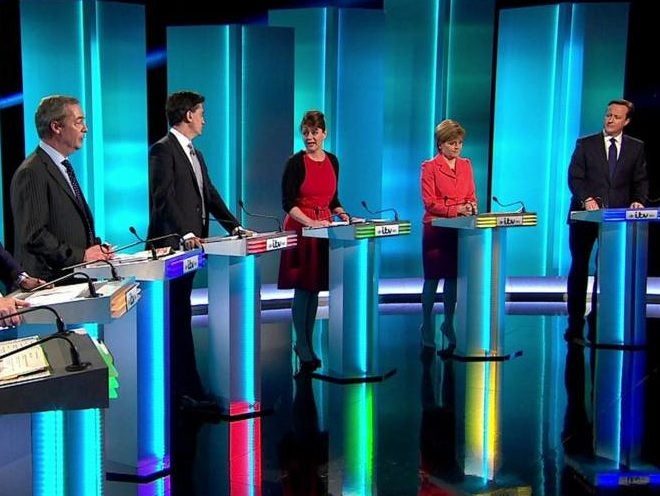
Theresa May will refuse to take part in televised leaders’ debates in the run-up to the June 8 general election, Number 10 sources have indicated.
Labour leader Jeremy Corbyn threw down the gauntlet to the Prime Minister with a direct challenge on Twitter saying: “If this General Election is about leadership, as Theresa May said this morning, she should not be dodging head-to-head TV debates.”
But a Downing Street source indicated that the Prime Minister would flatly reject any proposal for a TV showdown, telling the Press Association: “Our answer is no.”
Liberal Democrat leader Tim Farron accused May of “bottling” the debates and urged broadcasters to “empty chair” her if she refused to take part.
“The Prime Minister’s attempt to dodge scrutiny shows how she holds the public in contempt,” said Farron. “The British people deserve to see their potential leaders talking about the future of our country.”
Broadcasters have a “moral duty” to stage debates, said the Lib Dem leader, adding: “I expect the broadcasters to do the right thing, don’t let the Conservatives call the shots. If the Prime Minister won’t attend – empty chair her.”
Channel 4 News political editor Gary Gibbon wrote today: “No 10 is saying there will be no TV debates cluttering up your screens in this election.
“Rather than go down the route of pretending they’re longing for such things to happen but the logistics might be tricky they’ve gone for a more open approach: forget it.
“Don’t expect many press conferences either or extended interviews.
“Theresa May is not a huge fan of these sorts of encounters and her team think they open up risks that don’t need to be taken. So the 2017 general election will make the 2015 one look like ‘access all areas’ as far as the Tories are concerned.”
The first party leader election debates took place ahead of the May 2010 general election and involved just David Cameron, Nick Clegg and Gordon Brown. They took years of negotiation to arrange and ended up with three debates being broadcast on Sky, ITV and BBC One.
The 2015 general election debates schedule was far more complicated because of the need to include more minority parties.
The final deal thrashed out after more than six months of talks between political leaders and broadcasters saw the BBC host a a “challengers’ debate” featuring Labour leader Ed Miliband as well as the leaders of UKIP, Plaid Cymru, SNP and the Greens.
Tory Party leader took part in just one debate, featuring all six other party leaders (those menetioned aboved plus the Lib Dems) on ITV. There was also a special edition of Question Time on BBC One featuring the then leaders of three biggest Parliamentary parties: Miliband, Clegg and Cameron.
Cameron and Miliband appeared on a Sky News/Channel 4 interview and audience Q and A hosted by Jeremy Paxman (but did not share the stage at the same time).
Given Theresa May’s current commanding poll lead she may see the safest option has being to avoid TV debates altogether. According to the latest Yougov poll on voting intentions 44 per cent say they woud vote Conservative versus 23 per cent Labour.
This was the view taken by Margaret Thatcher going into the 1979 general election, when Labour’s Jim Callaghan was Prime Minister, and at her subsequent elections.
Her advisor Michael Dobbs told the BBC her team “realised that there was nothing to be gained by a relatively inexperienced woman going on television against a hugely experienced and avuncular opponent like Jim Callaghan – and particularly when she was pretty well ahead in the polls and expected to win.”
Conservative Prime Minister John Major refused to debate Labour’s Neil Kinnock in 1992 saying: “Every party politician that expects to lose tries that trick of debates and every politician who expects to win says no.”
In 1997 it was apparently Labour challenger Tony Blair who was reluctant to debate Major.
BBC political reporter turned Labour PR man Lance Price told the BBC: “Labour didn’t really want this debate to take place.
“Tony Blair was streets ahead in the opinion polls and when you’re out in front why take the risk? Why put yourself through the possibility of something going horribly wrong like that.”
Television is still by far the most influential medium when it comes to political decisions.
Research by Yougov after the 2015 general election found that 68 per cent of voters turned to TV for news coverage of the campaign, versus 52 per cent newspapers and 33 per cent radio.
A Panelbase survey reported by the BBC found that 38 per cent of voters were influenced by the TV debates in the run up to the 2015 general election.
It found that 62 per cent said TV coverage had the most influence over their vote versus 25 per cent – newspapers, 17 per cent – websites, 14 per cent – radio and 14 per cent – speaking to family and friends.
Picture: BBC
Email pged@pressgazette.co.uk to point out mistakes, provide story tips or send in a letter for publication on our "Letters Page" blog
